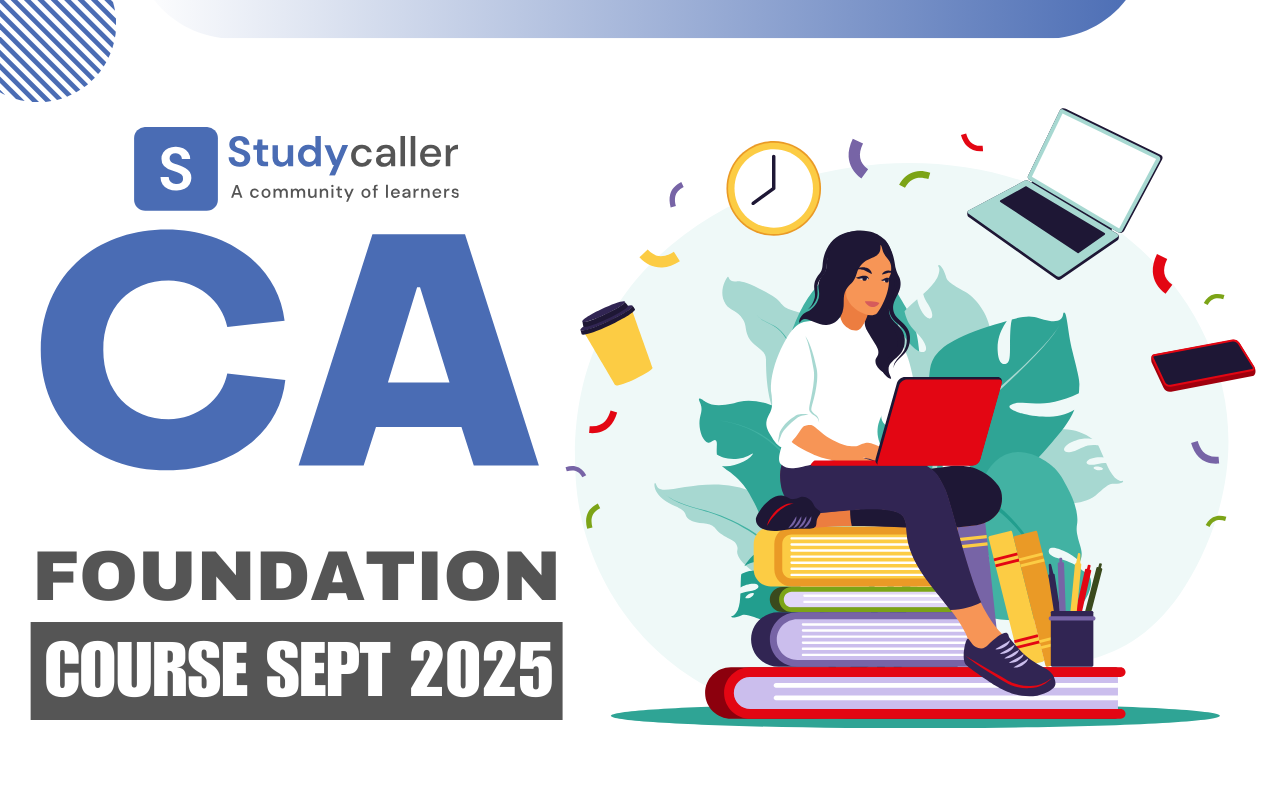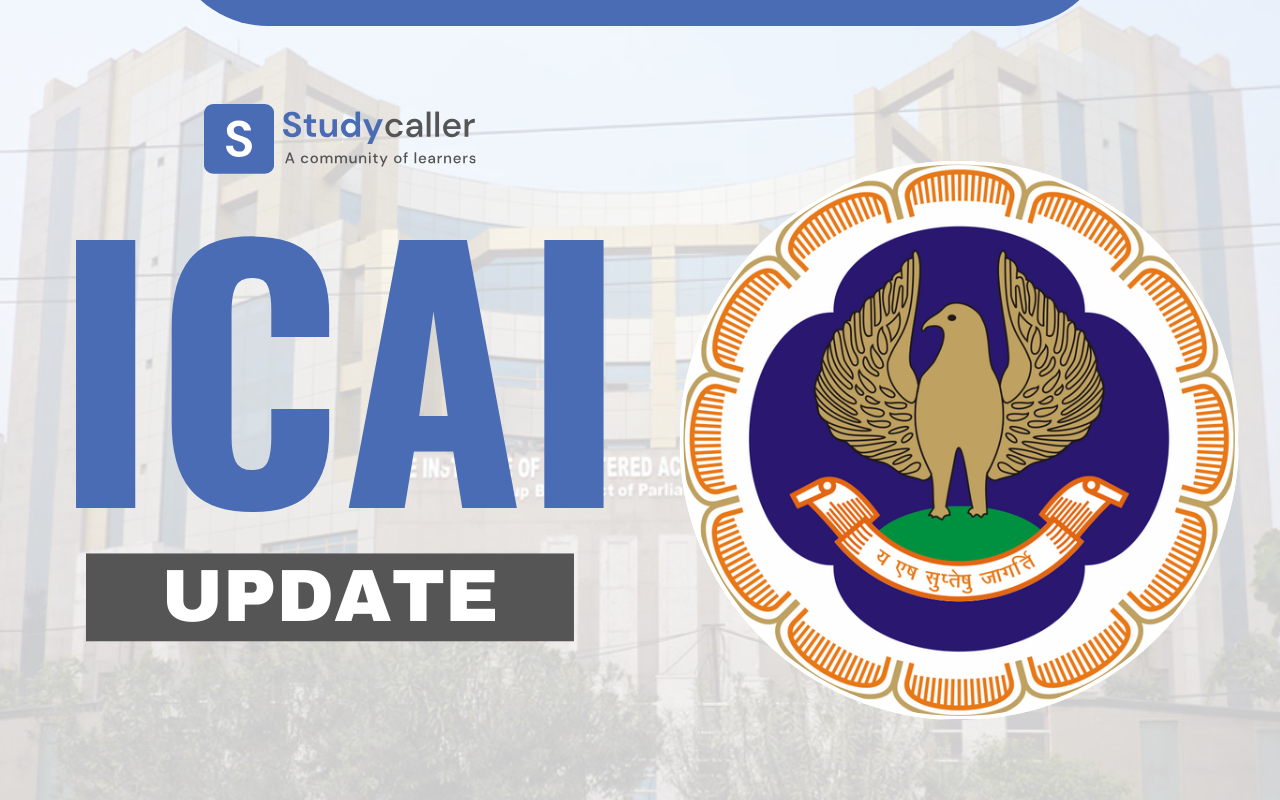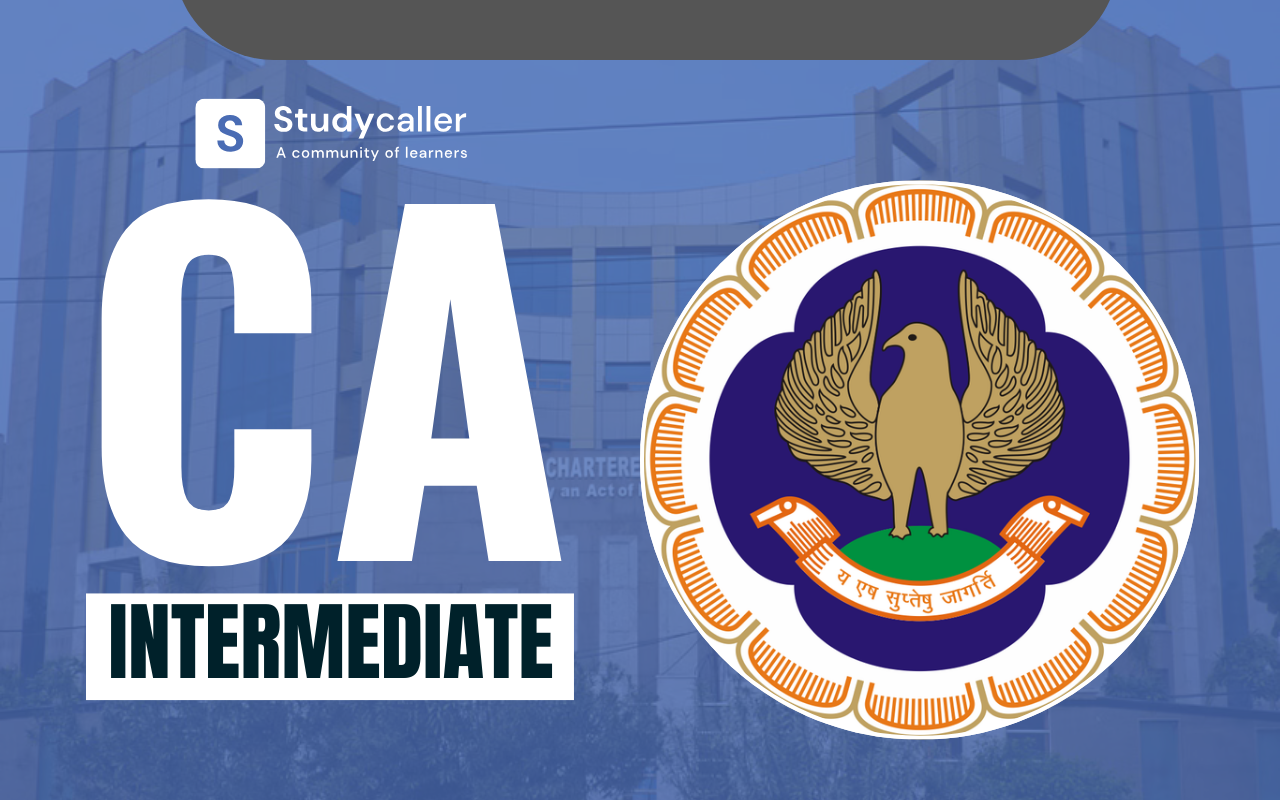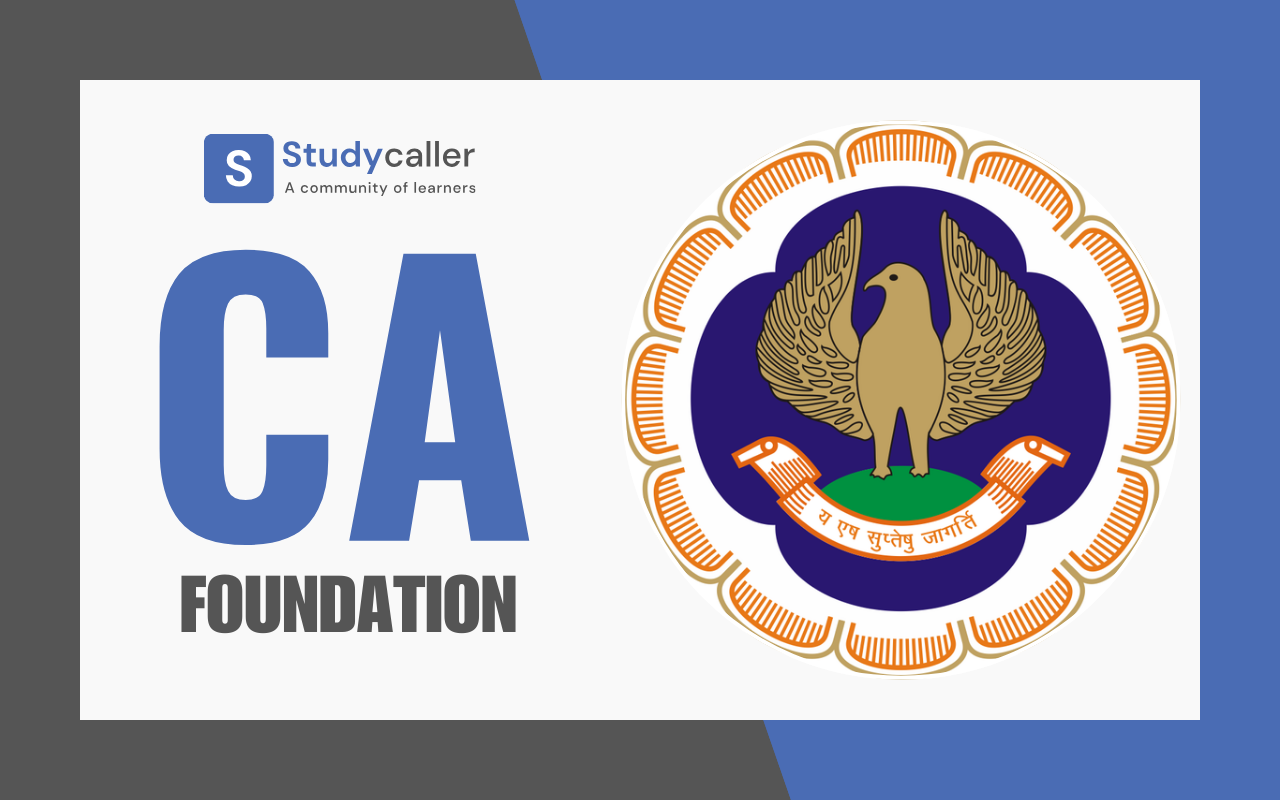CA Foundation Course May 2026: Check Eligibility, Syllabus & Preparation Tips
Get the details about the CA Foundation Course May 2026, with syllabus overview, ICAI registration steps, important dates, fees, and preparation strategy for new students


Table Of Content
- CA Foundation Course Details for May 2026
- What is CA Foundation?
- CA Foundation Exam Details for May 2026
- Eligibility Criteria for CA Foundation Course?
- CA Foundation Exam Pattern for May 2026
- CA Foundation Subjects-wise Syllabus for May 2026
- CA Foundation Admit Card 2026
- CA Foundation Important Dates for May Session 2026
- How to Register for the CA Foundation Course?
- CA Foundation Registration Validity
- CA Foundation Course Fee
- How to Prepare for the CA Foundation Course
- Summary
If you are starting your CA trip, the first step is to go to the CA Foundation. The CA Foundation course May 2026 helps you understand the basic principles of accounts. The Institute of Chartered Accountants of India (ICAI) conducts the Foundation Examination annually.
Earlier, the CA Foundation Examination was conducted 2 times a year, but from 2024, it will be held 3 times a year in January, May/June, and September.
To become a chartered accountant, a CA Foundation course is the initial level of the chartered accountant course. At this stage, you will study the principles of accounts, professional laws, quantitative qualifications, and professional economics. ICAI has updated the fixed dates of CA Foundation registration to their new plan.
Get full, detailed observation of the CA Foundation course from this blog; get registration details, eligibility, examination, fee, duration, course, exam pattern, exam form, admit card, etc.
CA Foundation Course Details for May 2026
Students who want to know the details about the CA Foundation course can refer to the table below. Here, you will find eligibility criteria, examination level, exam duration, exam mode, total fee, and more.
| Particular | Details |
| Exam Name | CA Foundation |
| Conducted by | Institute of Chartered Accountants of India (ICAI) |
| Exam Level | National Level |
| Eligibility | Completed or Appearing in Class 12th |
| Preparation Period | 4 Months |
| CA Foundation Course Subjects |
|
| Duration of Exam | 3 Hours |
| Mode of Exam | Offline |
| CA Foundation Total Fees | Rs. 11,500 or $1065 (for Foreign students) |
| Frequency | 3 times in a year, i.e., June, September, and Dec/Jan |
| Passing Criteria | Per subject—40% Aggregate – 50% |
Enroll Now for CA FoundationCourses
What is CA Foundation?
The CA Foundation is an entry-level examination for the Chartered Accountant course in India, run by the Institute of Chartered Accountants of India (ICAI). This is the first step for chartered accountants, designed to test the student's understanding of fundamental accounting, business, and financial concepts.
Examination includes topics such as accounting, business laws, business mathematics, and economics principles and practices. Clearing the CA Foundation is important to progress to the next level, CA Intermediate. It is suitable for students who have completed their 12th standard and wish to make a career in accounting and finance.
CA Foundation Exam Details for May 2026
The CA Foundation Exam 2026, conducted by the Institute of Chartered Accountants of India (ICAI), is conducted three times a year. The following are the main details for each session:
| CA Foundation Exam x Details (Tentative) | |||
| Details | January | May | September |
| CA Foundation 2026 Exam Dates | January 2026 | May 2026 | September 2026 |
| CA Foundation 2026 Admit Card | December 2025 | April 2026 | August 2026 |
| CA Foundation 2026 Result | February 2026 | June 2026 | October 2026 |
Eligibility Criteria for CA Foundation Course?
According to CA Foundation Eligibility, students who have passed their class 12 examination or are recognized by the Central Government can register for the CA Foundation.
However, due to the delay in the declaration of results of the 12th-class central and state boards, ICAI has revised the eligibility criteria and allowed provisional registration for students who have not passed their 12th examinations.
ICAI now allows students to register initially for the CA Foundation course after passing the 10th class examinations. It is also announced that this initial admission will be revised or regularized only when the candidate passes the 12th class exam.
CA Foundation Exam Pattern for May 2026
In 2026, the candidates who plan to take the CA Foundation Examination should have a clear understanding of the examination pattern. This knowledge will help them develop an effective preparation strategy to score well. The CA Foundation exam pattern 2025 is observed below:
| CA Foundation 2026 Exam Pattern | |
| Mode of exam | Pen and Paper-based |
| Type of Question | Papers 1 and 2: Subjective Papers 3 and 4: Objective |
| Exam Duration | Papers 1 and 2: 3 hours Papers 3 and 4: 2 hours |
| Medium of Exam | English/Hindi |
| Number of Papers | 4 |
| Total Marks | Total 400 (100 for each paper) |
| Negative Marking for the wrong answer | Papers 1 and 2: No Papers 3 and 4: 0.25 mark deduction |
CA Foundation Subjects-wise Syllabus for May 2026
ICAI released a new course for the CA Foundation 2026 Exam, subject-wise or paper-wise. The description of the new subject-wise CA Foundation Syllabus is as follows:
Paper 1: Accounting
The first paper will be accounting in the CA Foundation course. Paper 1 aims to provide ideological knowledge about the basic principles of accounting and evaluate your ability to solve the basic questions of accounting.
| Topics | Sub-Topics |
| Theoretical Framework | 1. Meaning and Scope of Accounting. 2. Accounting concepts, principles, and conventions. 3. Capital and revenue expenditure, capital and revenue receipts, contingent assets, and contingent liabilities. 4. Accounting Policies. 5. Accounting as a measurement discipline—valuation principles, accounting estimates. Accounting Standards-Concepts and Objectives. |
| Accounting Process | 1. Recording accounting transactions: principles of double entrybook-keeping, books of original entry-journal, subsidiary books, cash book, ledger format, posting from journals and subsidiary books, and balancing accounts. 2. Preparation of Trial Balance. 3. Rectification Of Errors |
| Bank Reconciliation Statement | Introduction, reasons and preparation of bank reconciliation statement |
| Inventories | Meaning, basis and technique of inventory valuation, cost of inventory, net realisable value and record system |
| Depreciation and Amortisation | Tangible and intangible assets-—meaning & difference, concepts, methods of computation and accounting treatment of depreciation/amortisation, change in depreciation method |
| Bills of Exchange and Promissory Notes | Meaning of bills of exchange and promissory notes and their accounting treatment; accommodation bills. |
| Preparation of Final accounts of Sole Proprietors | Elements of financial statements, closing adjustment entries, trading accounts, profit and loss accounts, and balance sheets of manufacturing and non manufacturing entities |
| Financial Statements of Not-for-Profit Organizations | Significance and preparation of receipt and payment account, income and expenditure account and balance sheet; difference between profit and loss account and income and expenditure account |
| Accounts from Incomplete Records (excluding preparation of accounts based on ratios). | – |
| Partnership And LLP Accounts | 1. Final accounts of partnership firms and LLPs. 2. Admission, retirement, and death of a partner, including treatment of goodwill. 3. Dissolution of partnership firms and LLPs, including piecemeal distribution of assets |
| Company Accounts | 1. Definition of Shares and Debentures. 2. Issue shares and debentures, forfeiture of shares, and reissue of forfeited shares. 3. Redemption of preference shares and debentures (excluding purchase and redemption of own debentures sinking fund method). 4. Accounting for Bonus Issue and Right Issue. |
Paper 2: Business Law
The second paper of the CA Foundation course is Business Law. Paper 2 is a completely new subject for all students who have passed their 12th standard. Business law is an essential part of the CA profession, and the subject is included in the CA Foundation level to increase its knowledge about some basic business laws.
| Topics | Sub-Topics |
| Indian Regulatory Framework | Major Regulatory Bodies such as the Ministry of Finance, Ministry of Corporate Affairs, SEBI, RBI, IBBI, Ministry of Law and Justice, etc. |
| The Indian Contract Act, 1872 | General Nature Of Contract, Consideration, Other essential elements of a valid contract, Performance Contract, Breach Of Contract, Contingent and Quasi Contract, Contract of Indemnity and Guarantee, Contract of Bailment and Pledge, Contract of Agency |
| The Sale of Goods Act, 1930 | Formation of the contract of sale, Conditions and warranties, Transfer of ownership and delivery of goods: unpaid seller and his rights. |
| The Indian Partnership Act, 1932 | General Nature of Partnership, Rights and Duties of partners, Reconstitution of firms, Registration and Dissolution of a firm |
| The Limited Liability Partnership Act, 2008 | Introduction-covering nature and scope, Essential features, Characteristics of LLP, Incorporation and Differences with other forms of organisations |
| The Companies Act, 2013 | Essential features of company, Corporate veil theory, Classes of companies, Types of share capital, Incorporation of company, Memorandum of Association, Articles of Association, Doctrine of Indoor Management |
| The Negotiable Instruments Act, 1881 | Meaning of Negotiable Instruments, Characteristics, Classification of Instruments, Different provisions relating to negotiation, Presentment of Instruments, Rules of Compensation |
Paper 3: Quantitative Aptitude
The third paper of the CA Foundation course is Quantitative Aptitude. Paper 3, Quantitative Aptitude, consists of three parts: business mathematics, logical reasoning, and statistics. This subject will allow you to check your calculation ability to perform better in further levels of the CA course.
| Topics | Sub-Topics |
| Part A: Business Mathematics | |
| Ratio and proportion, Indices and Logarithms | Ratio and proportion and Time and work-related problems, Laws of Indices, Exponents and Logarithms and AntiLogarithms |
| Equations | Linear Equations Upto Three Variables, Quadratic and Cubic equations in one variable. Applications in Business Related Problems. |
| Linear Inequalities | Linear Inequalities in one and two variables and the solution space |
| Mathematics of Finance | – Simple Interest – Compound Interest – Nominal and Effective Rate of Interest – Present Value – Net Present Value – Future Value – Perpetuity – Annuities – Sinking Funds – Calculating EMI – Calculations of Returns: Nominal and Effective rate of Return – Compound Annual Growth Rate(CAGR) |
| Permutations and Combinations | Basic concepts of Permutations and combinations: Introduction, the factorial, permutations, results, circular permutations, permutations with restrictions, Combinations With standard results |
| Sequence and Series | Introduction Sequences, Series, Arithmetic and Geometric progression, Relationship between AM and GM and Sum of terms of special series and Business Applications |
| Sets, Relations, and Functions. Basics of Limits and Continuity Functions | |
| Basic applications of Differential and Integral calculus in Business and Economics (Excluding the trigonometric applications) | |
| Part B: Logical Reasoning | Number series coding and Decoding and odd man out, Direction Tests, Seating Arrangements, Blood Relations |
| Part C: Statistics | |
| Statistical Representation of Data | Diagrammatic representation of data, Frequency Distribution, Graphical representation of Frequency Distribution–Histogram, Frequency Polygon, Ogive, Pie-chart |
| Sampling | Basic principles of sampling theory, comparison between sample survey and complete enumeration, some important terms associated sampling type of sampling,sampling and non-sampling errors. |
| Measures of Central tendency and Dispersion | Mean Median, Mode, Mean Deviation, Quartiles and Quartile Deviation, Standard Deviation, Coefficient of Variation, Coefficient of Quartile Deviation |
| Probability | Independent and dependent events;mutually exclusive events.Total and Compound Probability and Bayes Theorem |
| Theoretical Distributions | Random variables, Discrete and Continuous Random variables, Expectation of a discrete random variable, Theoretical Distributions:Binomial Distribution, Poisson distribution–basic application and Normal Distribution–basic applications |
| Correlation and Regression | Scatter diagram, Karl Pearson’s Coefficient of Correlation Rank Correlation, Regression lines, Regression equations,Regression coefficients |
| Index Numbers | Uses of Index Numbers, Problems Involved in Constructing Index Numbers, and Methods of Constructing Index Numbers. BSE SENSEX NSE |
Paper 4: Business Economics
Fourth paper of CA Foundation in Business Economics. Paper 4, Business Economics Commerce Stream, is a familiar topic for students. This letter includes the basics of economics and its rules.
| Topics | Sub Topics |
| Introduction to Business Economics |
Meaning and scope of business economics. Basic Problems of an Economy and Role of Price Mechanism |
| Theory of Demand and Supply | 1. Meaning and Determinants of Demand, Law of Demand, and Elasticity of Demand—Price, Income, and Cross Elasticity. 2. Theory of Consumer’s Behavior—Indifference Curve Approach. 3. Meaning and Determinants of Supply, Law of Supply and Elasticity of Supply, Market Equilibrium and Social Efficiency |
| Theory of Production and Cost | Meaning and Factors of Production, Short Run and Long Run. Law of Production—The Law of Variable Proportions and Laws of Returns to Scale,Producer’s Equilibrium.Concepts of Costs – Short-run and long-run costs, Average and Marginal Costs, Total, Fixed andVariable Costs |
| Price Determination in Different Markets | 1. Market Structures: Perfect Competition, Monopoly and Monopolistic Competition. Using Game Theory to study Oligopoly. 2. Price Determination in these Markets. 3. Price- Output Determination under different Market Forms |
| Determination of National Income | 1. Macro Economic Aggregates and Measurement of National Income 2. Determination of National Income: Keynes’ Two Sector Basic Model, Three Sectors and Four Sectors Models |
| Business Cycles | Meaning, Phases, Features, Causes behind these Cycles |
| Public Finance | 1. Fiscal functions: AnOverview, Centre and StateFinance. 2. MarketFailure/Government Intervention To Correct Market failure. 3. Process of budget making: Sources of Revenue, Expenditure Management, and management of Public Debt. 4. FiscalPolicy |
| Money Market | 1. Concept of Money Demand 2. Important theories of Demand for Money 3. Concept of Money Supply, Cryptocurrency Another New Terminology 4. Monetary Policy |
| International Trade | 1. Theories of international trade, including theories of intra-industry trade (Krugman). 2. Trade Policy–The Instruments of Trade Policy. 3. Trade Negotiations. 4. Exchange Rates and Their Economic Effects. 5. International Capital Movements: Foreign Investment |
| Indian Economy | 1. Before 1950—Chanakya and Nand Vansh 2. OECD Paper (1950-1991), 3. Basic knowledge, 1991 Onwards |
CA Foundation Admit Card 2026
An admit card is required to sit in the examination hall. ICAI usually accepts the card 14 days before the exam. In addition, it has stopped sending physical or offline admit cards. Now, you can only download the CA Foundation Admit Card online from the ICAI website.
ICAI issued the CA Foundation May 2026 Admit Card on its e-services website before 10 to 15 days of exam.Candidates can download their admit card using their login credentials. The admit card will include the required details, such as the candidate's information and the name and location of the assigned test center. The direct link is given below to download the CA Foundation Admit Card for the May 2026 session.
CA Foundation Important Dates for May Session 2026
The table below mentions the dates of the important CA Foundation for May 2026 examinations:
| Events | Dates for May 2025 |
| CA Foundation Exam Form Date May 2026 | 03rd March, 2026 |
| CA Foundation Exam Date May 2026 | 14, 16, 18, and 20, May 2026 |
| Admit Card Release Date | 10 Days before Exam |
| CA Foundation Result May 2026 | 45 days after the exam date |
| Last date for Registration in CA Foundation May 2026 | 1 January, 2026 |
| First Foundation Examination under the New Scheme | June 2024 |
How to Register for the CA Foundation Course?
Follow these simple steps to register for the CA Foundation Course:
Step 1: Visit the ICAI Website: Go to the official ICAI website—www.icai.org—and click on the “Self Service Portal (SSP)” link.
Step 2: Create an Account (For New Users): If you’re a new user, register by providing your name, date of birth, email ID, and mobile number. You’ll receive a login ID and password.
Step 3: Log in to the SSP Portal: Use your login credentials to access the SSP portal and click on “Student Cycle” > “Foundation Course.”
Step 4: Fill Out the Registration Form
Enter your details, academic qualifications, and other required information correctly.
Step 5: Upload Required Documents: Scan and upload the following documents:
- Passport-size photograph
- Signature
- 10th Marksheet (Proof of Date of Birth)
- 12th Marksheet (If available)
Step 6: Pay the Registration Fee: Pay the registration fee online using a debit/credit card or net banking. The current registration fee is ₹9,000 (as per ICAI norms; may vary).
Step 7: Download the Registration Form: After successful payment, download the form and keep a copy for your records.
Step 8: Registration Confirmation: Once verified by ICAI, you’ll receive a confirmation email and SMS. You can also download the registration letter from the portal.
CA Foundation Registration Validity
CA Foundation Registration is valid for 3 years. It can be revalidated for another 3 years with a fee of ₹ 300. This reevaluation can be done several times, allowing students to complete the course within the extended time limit.
CA Foundation Course Fee
The CA Foundation Course fee for Indian students is Rs. 10,900, and for foreign students, it is $1065. However, it is not to be paid as a one-time payment. At the time of registration, you will get Rs. 9000 plus Rs. 200 for the cost of the Foundation Prospectus.
We also recommend taking a membership in the students' magazine, as you will get the latest updates from it. While filing the Foundation Exam Form, you have to pay Rs 1500. For foreign students, the registration fee for the cost of the foundation prospectus is more than $720. The exam form fee is $325.
Check the complete table to learn about the CA Foundation Course fees for Indian and foreign students.
| CA Foundation Fee Details | Indian Students | Foreign Students ($) |
| Cost of Foundation Prospectus | 200 | 20 |
| Foundation Registration Fees | 9000 | 700 |
| Subscription for Students Journal (For one year—Optional) |
200 | 20 |
| Foundation Examination Fee | 1500 | 325 |
| Total | Rs. 10,900 | $1065 |
The CA exam form fee for the Kathmandu Center is Rs. 2200. Once the above registration process is completed, the CA Foundation Studies material will be sent to the candidates through the Centralized Relations System (CDS).
How to Prepare for the CA Foundation Course
- Understand the course: Familiarize yourself with exam patterns and courses; cover four papers: vocational theory and management, business law and business correspondence and reporting, accounting, business mathematics and logical arguments, and statistics.
- Make a study plan: Develop a structured study schedule, allocate time for each subject, and set realistic goals.
- Study materials: Use the ICAI study material, a practice manual, and recommended reference books to understand the concepts.
- Practice Question: Solve practice questions, previous papers, and fake tests to assess your knowledge and identify areas for improvement.
- Time Management: Manage your time effectively during the exam; allocate enough time for each question.
Summary
The CA Foundation Course is an entry-level certification introduced by the Institute of Chartered Accountants of India (ICAI). It introduces students to fundamental concepts in accounting, professional laws, and management. The course is ideal for class 12 passouts and provides a foundation to carry forward a chartered accountancy career. It consists of four papers, and registration is valid for three years. Students can reevaluate their registration for three years with nominal fees.
FAQs
What is CA Foundation Course May 2026?
The CA Foundation Course May 2026 is the entry-level Chartered Accountancy examination conducted by ICAI for class 12 pass students, aiming to assess fundamental knowledge in accounting, laws, maths, and economics before progressing to Intermediate level.
When will the CA Foundation Course May 2026 exams be held?
The CA Foundation May 2026 exams are scheduled on 14th, 16th, 18th, and 20th May 2026, with four papers conducted over these dates, as per the official ICAI timetable.
How many papers are in the CA Foundation Course May 2026 exam?
The CA Foundation Course May 2026 consists of four papers, each carrying 100 marks, making a total of 400 marks, covering accounting, laws, quantitative aptitude, and business economics.
What is the pattern of the CA Foundation Course May 2026 exam?
Papers 1 and 2 are subjective (descriptive) types while Papers 3 and 4 are objective (MCQs) with a mixture of analytical and theoretical questions, as specified by ICAI exam pattern.
How is negative marking applied in CA Foundation Course May 2026?
Negative marking applies in the objective Papers 3 and 4 of the CA Foundation Course May 2026; typically 0.25 marks are deducted for each incorrect answer in MCQ sections.
Who is eligible for the CA Foundation Course May 2026?
Students who have passed or appeared in Class 12 examinations from a recognized board are eligible to register for the CA Foundation Course May 2026 and sit for the exams.
What is the registration last date for CA Foundation Course May 2026?
To appear in CA Foundation Course May 2026, candidates must complete online registration on ICAI’s portal by around 1st January 2026, with application forms closing mid-March as per official deadlines.
Where do I register for the CA Foundation Course May 2026?
Registration for the CA Foundation Course May 2026 must be completed online via the ICAI Self Service Portal (SSP), where applicants upload documents, pay fees, and submit the exam form.
How many attempts are available for CA Foundation Course May 2026 candidates?
The ICAI conducts CA Foundation exams three times a year (January, May/June, September), so candidates can attempt the CA Foundation Course May 2026 and future sessions upon eligibility.
What are the subjects in the CA Foundation Course May 2026 syllabus?
The CA Foundation Course May 2026 syllabus includes Principles of Accounting, Business Laws, Quantitative Aptitude, and Business Economics, covering both theoretical and analytical concepts.








